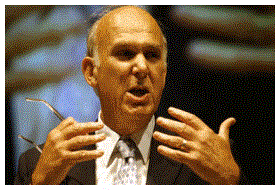Vince Cable: Futures markets are a model of transparency

Vincent Cable, the Liberal Democrat shadow Chancellor, has said the exchange-traded futures industry serves as a model of transparency for the effective running of financial markets.
In an interview with FOW ahead of tomorrow’s (6 May) UK general election, Cable said he foresaw no need of radical reform in the listed derivatives markets.
“In general, the commodities and other futures markets have led the way in showing how financial markets should operate,” he said.
“Specifically, the transparency of exchange-traded futures should be seen as example to be followed by other markets, in particular for credit default swaps”, added Cable, who served as chief economist at Shell, the largest London-listed company by revenue, in the 1990s.
Criticising his rivals in the run up to Thursday’s general election, Cable said: “Labour has repeatedly refused to tackle the structural problems in the banking sector, and the Conservatives are unwilling to make reforms without international agreement.”
In response, a Conservative spokesperson pointed out their party’s manifesto commitment to a levy on banks, and the party’s promise to act unilaterally if necessary. A spokesperson from the Labour party was not immediately available for comment.
Cable said the Liberal Democrats would seek to “separate high-risk investment banking and low-risk high street banking” should they gain power, echoing the sentiment of the far-reaching financial reform bill now being debated in the US Senate. He also lent tacit support to the Senate Agricultural Committee’s proposed amendment to the bill, which effectively bans deposit holding banks from proprietary trading of derivatives.
“This would likely be the natural result of splitting low-risk retail banking and high-risk investment banking”, said Cable. “The taxpayer should never again be expected to foot the bill for the reckless gambling of ‘casino’ bankers.”
Asked what he would do about an inevitable City backlash in response to such changes, Cable was philosophical.
“The financial crisis must make us look critically at the City’s contribution. There are considerable benefits from the City, but, as we have now discovered, major systemic risks which can spill over into the rest of the economy. It is the job of policy makers, and specifically regulation, to cut the risks relative to the benefits.”
He concluded that: “I know that many in the City have been horrified by the path their colleagues and rivals trod in recent years and it is by no means certain that there would be a ‘backlash’. My approach to the City is not one of hostility, or of obsequiousness. I recognise its importance. But we must ensure that the banking sector can never put the stability of the UK economy at risk.”
Tom Osborn +44 207 779 8361 tosborn@fow.com
Found this useful?
Take a complimentary trial of the FOW Marketing Intelligence Platform – the comprehensive source of news and analysis across the buy- and sell- side.
Gain access to:
- A single source of in-depth news, insight and analysis across Asset Management, Securities Finance, Custody, Fund Services and Derivatives
- Our interactive database, optimized to enable you to summarise data and build graphs outlining market activity
- Exclusive whitepapers, supplements and industry analysis curated and published by Futures & Options World
- Breaking news, daily and weekly alerts on the markets most relevant to you


